The Zero SR-X Is A Preview Of The Bright Future Of Electric Motorcycles

An internal combustion motorcycle, like any single one of the bikes at the 2023 Handbuilt Motorcycle Show, is a wonderfully complex machine. Compared to a gas-powered custom-built bike, a production EV is simpler, and, therefore, a less soulful steed to some. Zero Motorcycles and Huge Design want to change how we see fully-electric bikes with the Zero SR-X concept, which combines the minimalist style of an EV with the mechanical intricacy of a 1,000cc sports bike.
Full disclosure: Zero invited me to the 2023 Handbuilt in Austin, Texas, to see the Zero SR-X concept and speak with its designer. Zero paid for my hotel and fed me. We talked about the future of motorcycles and their ongoing transition to EVs over the best pancakes in Austin, found at the Counter Cafe.
Rather than make a new EV motorcycle with design flourishes that try to mask or distract from the shoebox that is an EV drivetrain, Bill Webb of Huge Design has managed to make an EV bike with more soul than many riders are willing to give EVs credit for — myself included. Even though EV bikes are awesome for the progress they represent, it’s hard to elevate their battery packs and motors to the sensual appeal of a big BMW boxer or Harley-Davidson v-twin engine.
Part of the whole point of motorcycle (and car) shows is that these machines are as pleasing to look at as they are to operate, but not many EV bikes trigger the same neural centers as combustion-powered bikes. There are no protruding cylinders, no cooling metal fins, no fuel lines, and no exhaust pipes. To be fair, EV motorcycles have their own utilitarian appeal. When done right, an EV bike can conjure the simplicity that Dieter Rams strived for, but simplicity is not really what many memorable motorcycle designs of the past were after.
Photo: Zero Motorcycles
Bridging the past between combustion-powered motorcycles and the fully-electric bikes of the future is no easy task, but that’s what Webb and Huge Design aimed for with the Zero SR-X. Webb is an industrial designer by trade who’s worked with Zero before: their previous collaboration yielded the concept bike that eventually went on to become the Zero FXE.
Webb has a knack for taking something as uneventful as a box — for example, a boring hard drive — and turning it into something more. So, when Zero decided it wanted to define what the future of its bikes will look like, the American EV maker approached Webb and his design firm.
I got a chance to talk with both Webb and Dan Quick from Zero about the SR-X concept, which, as of now, is not planned for production. I guess it’s fitting that the SR-X was at the Handbuilt Show, where the bikes on display are one-of-one builds. And against that backdrop of ’rad custom motorcycles, we talked about the conflict of designing the future of motorcycles without letting go of their past.
BW: It’s a constant creative conflict. I’ll be working on it, and I’ll be like, ‘Oh, no that’s too motorcycle-y.’ Like, not redneck, but you know what I mean.
JR: We’ll call it “crude.”
BW: Some of these bikes, a designer would look and say ‘Ugh, that’s so tacky.’ I’m trying to walk that fine line of making an industrial designer appreciate it and the guy that loves just straight up twisted metal and candy paint. Can I get him interested? I’m trying to get two people on two different ends of the spectrum. The reality is it’s still kind of a designer bike, and plenty of guys in here will be like, ‘What the fuck is that?’ But I’m just trying to find that middle ground between electric and gas, and designer and enthusiast.
JR: That’s a lot of things or places to pull from. It sounds like quite the conflict.
BW: Yeah, and, ultimately, you’re trying to create something that you can’t categorize. I’m hoping some people look at it and say, ‘Ah, that’s just a sport bike.’ But maybe they don’t know motorcycles, and the people who do know motorcycles say, ‘Wait a minute, that’s not a sport bike!’
JR: I think from the side profile you definitely nailed the “kilobike” aesthetic, but when I look at the front, it’s unlike any sport bike I’ve seen.
BW: Well, there’s a certain — the designer in me wants everything pure and rational. If you look at the side of the bike, see how everything is a straight line with a radius? The entire bike is composed of straight lines and rounded corners. I dare you to find — there’s a few — but try to point out all of the things that aren’t intersecting in a straight line and a rounded corner.
JR: Alright. Challenge accepted.
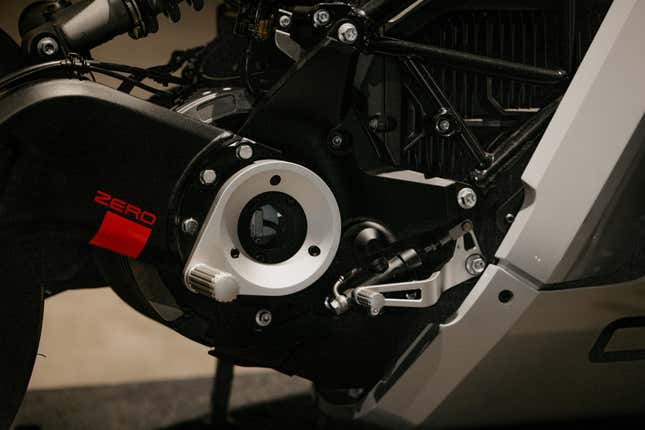
Photo: Zero Motorcycles
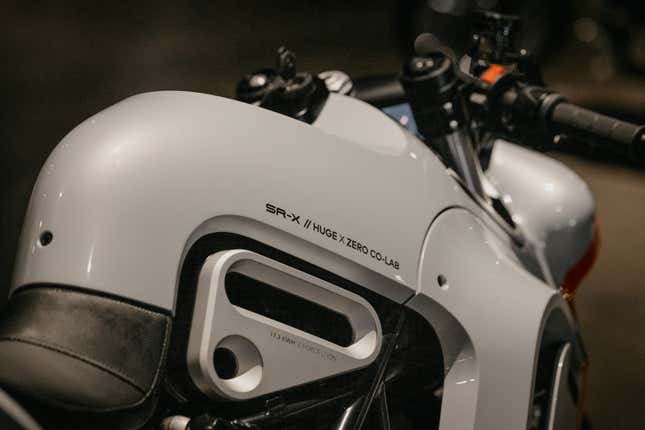
Photo: Zero Motorcycles
BW: Obviously, everything is organic, but everything is intersecting. So, when I build this in 3D, I take these super-organic surfaces and try to make them meet in rational intersections. That’s basically all I’m doing.
JR: Well, this bike is the epitome of the future. It’s this futuristic EV, which I’ve never seen the likes of before, but did you draw on anything from the past? Can you recognize that same aesthetic harmony you’re describing in any bike from the ’60s, ’70s or ’80s?
BW: Yeah, definitely. I think the ’70s and ’80s. There’s almost this kind of hand sanded effect. Think about ’70s race bikes. A lot of them are just fiberglass. Some guy just sanded something then laid fiberglass over it, so it has that sense that it wasn’t made by a machine. And so everything comes from that. This surface is machine-made, but everything has a hand-sculpted feeling. I was trying to combine the sense of, ‘a machine did that, but a human did this.’
JR: Was there anything you had to leave out that you really didn’t want to, but at the end, you had to take this or that out, or otherwise change this design?
BW: Honestly, the biggest challenge is — I’m not really answering your question (laughs) — but the electric chassis and drivetrain is such a fucking box that you’re trying to do this sexy design, but it’s like trying to put an egg around a refrigerator. And you want to be honest with the design. You don’t want to add gratuitous volume.
JR: Speaking of volume, how much does this weigh?
BW: It’s probably heavier than it could be because all it is machined. It starts out as blocks of ABS; this is probably different than any bike in here. We have a shop in China where they glue big blocks of plastic together and machine all these shapes out of solid blocks of ABS, which is not a…super efficient way to do it. But in order to make it strong enough, it’s thicker than it would be in production. A production bike would be 4mm thick but all these housings are 10mm. It’s kind of heavy, to be honest, although in production, it would be as light as any other Zero bike.
JR: And how close is this to production?
DQ: …I think that would be better answered by the person who took it from a production version and put it into the current state you see here. As far as whether or not it would become one […] I can tell you we don’t have any plans right now. But what I’m super excited about, personally, is that these two Huge Design builds, and the production FXE, introduce a very defined design language for the brand that previously didn’t exist […] If you look at kidney grilles on a BMW, that’s sacrosanct. Or the Geely Auto rear lights on Volvos. Those things are iconic. What Bill’s done is given us a design language and identity that we didn’t previously have. You can be the leader in a category, and still not have that identity.
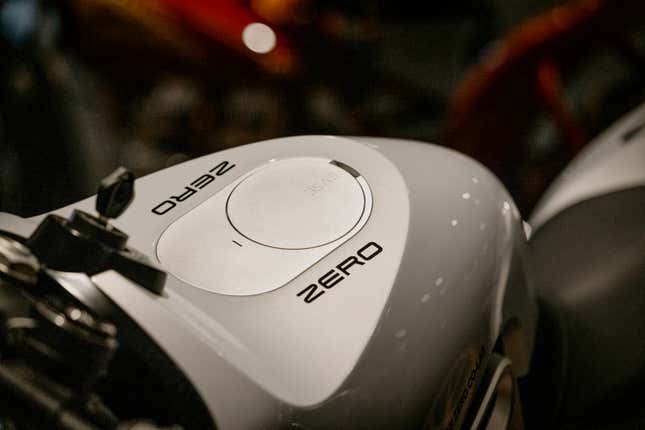
Photo: Zero Motorcycles
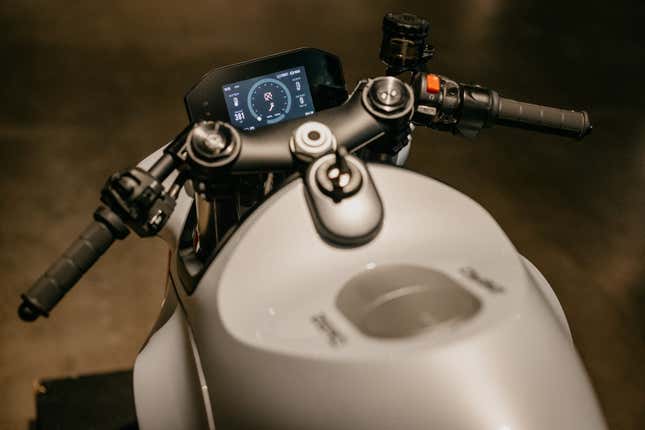
Photo: Zero Motorcycles
BW: I think the potential is there to take it to production. That was my goal the whole time. You know, a lot of bikes in here are ridiculous customs. Everything is hand-machined. Everything is a one-off. The builders don’t care or plan to make it to production, but every time I do a custom bike, I’m thinking about production. All these parts bolt to the frame. I want to make it really hard for [Zero] not to make this EV.
JR: With EV bikes, it’s just so difficult to disassociate. You’re trying to be conservative in some sense because motorcycles have been around for over 100 years, but, at the same time, EVs are supposed to be futuristic or emblematic of the future. How do you commensurate the future and the past?
BW: I’m always trying to walk a fine line between the past and the future. If you look at the headlight, it’s ridiculously rational in some ways. It’s a perfect capsule. If you look at it straight on, it’s just a straight line. It’s the most pure thing you can do, but then you contrast that with exposing something as traditional as a spring shock. It’s all about combining those elements so you don’t forget it’s motorcycle, but you’re also being told it’s something new. I don’t actually know if they can make an LED headlight like this. There’s some challenges to making a “beam-of-light” light.
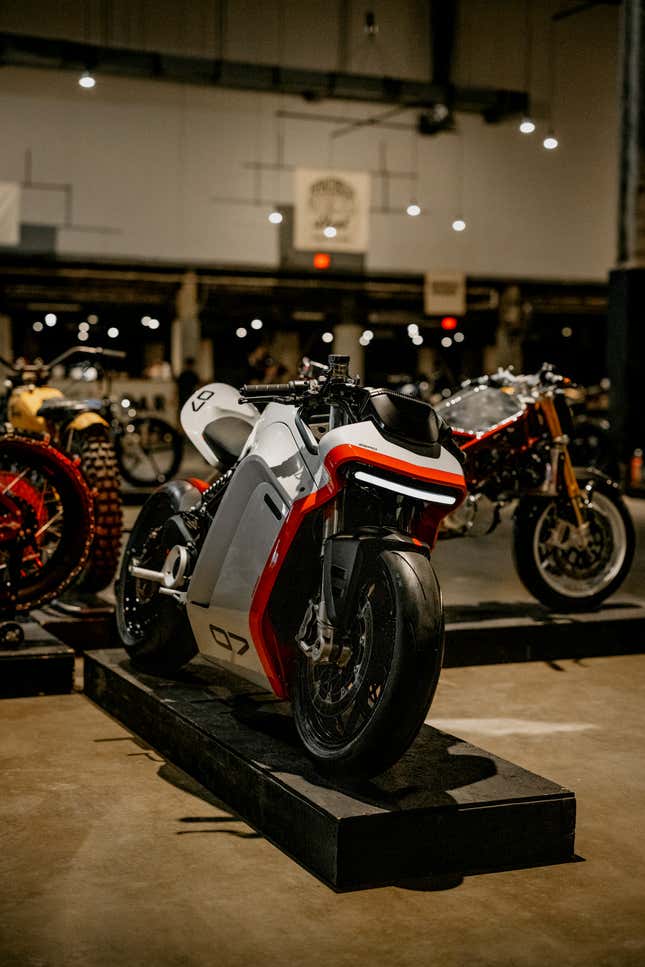
Photo: Zero Motorcycles
DQ: Hey, somebody can! I think the whole thing — based off what I’m learning here — is that this is an exercise in balance. You’re talking about the conflict of the design. There are two angels, or devils, on your shoulders. José is talking about the balance between the future and the past. And I’m talking about the balance of some cool custom made through the lens of a practical machine. And I’m sure — I don’t want to put words in your mouth — but I’m sure “practical” or “practicality” isn’t one of the words in the vocabulary of your design outfit. There’s got to be a balance between pushing the boundaries of design but staying within the bounds of what’s realistic.
JR: I’m thinking of Dieter Rams, whose product designs were practical but beautiful. They were functional, and yet they were so clean. You’d look at the thing he designed and just knew — or could intuit — what it was used for. And that’s what motorcycles do. Bikes and riders have a visceral connection! It’s in the gut.
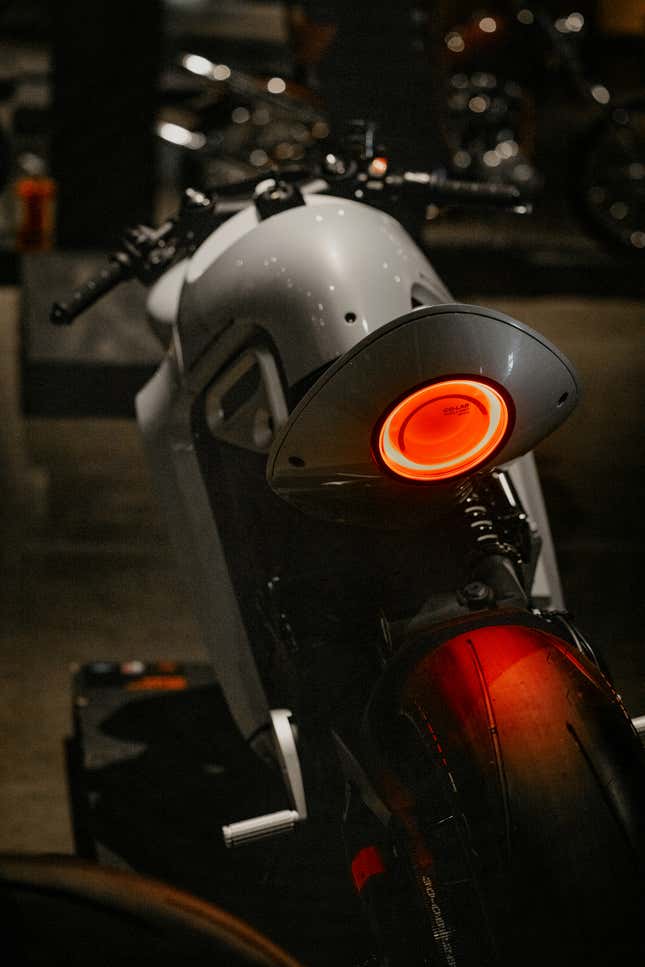
Photo: Zero Motorcycles
BW: I think our background in consumer electronics is why this concept is so production ready. We have other clients for whom we designed a cell phone. You wouldn’t believe what goes into designing the bezel of a cell phone, and we’re not even engineers […] Or to talk about the industrial design side of things, think about designing a hard drive. Start with how much does it store? How much does it cost? We can’t really compete at that level. It’s just a box, after all. So, instead, it’s all about making you say, ‘I want this fucking box! I don’t know why.’ You have to tap into some irrational sense. That’s the hardest thing to do with a hard drive. In a way, it’s so easier to do with a motorcycle.
JR: Hmm. I think it was Seagate. I don’t know if you ever saw that Seagate hard drive. It looked just like the hard drive on a macOS desktop.
BW: We did that! It’s the Seagate Seven.
JR: Wait! That was you guys? That was Huge Design?
BW: Yeah! That was us.
JR: OK. If the SR-X ever goes into production I want a sticker on the fairing of that hard drive. It’s funny you mentioned a refrigerator on wheels earlier, Bill, because a fridge is inherently unsexy. A hard drive is supposed to be unsexy, too, but that hard drive isn’t. Nor is this EV as unappealing as some of its predecessors.
For the record, Zero is still not committing to a production model of the SR-X. I suppose that’s fine, as long as whatever EV is up next for Zero retains most of what Webb managed to imprint onto the SR-X. Against all odds, Webb and Huge Design have taken a fully-electric motorcycle — a shoebox crammed in a tiny wheelbase — and turned it into a two-wheeler motorcyclists can drool over.
I know because I was there, watching as riders of all walks beamed at the sight of the Zero SR-X. And Bill has managed to make a concept bike that’s nearly production-ready into something that hardly feels out of place amongst the raddest bikes at the 2023 Handbuilt Motorcycle Show.
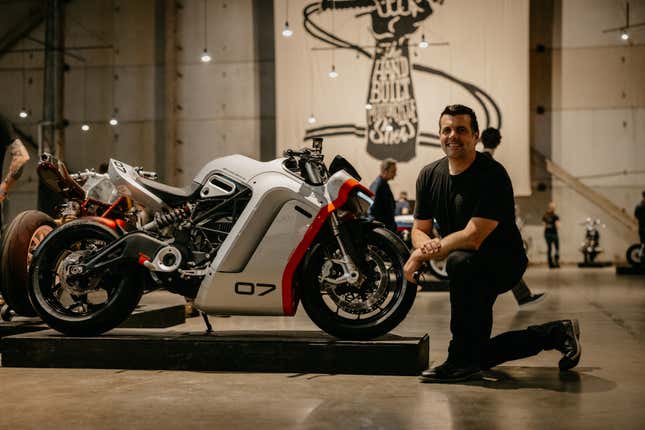
Photo: Zero Motorcycles
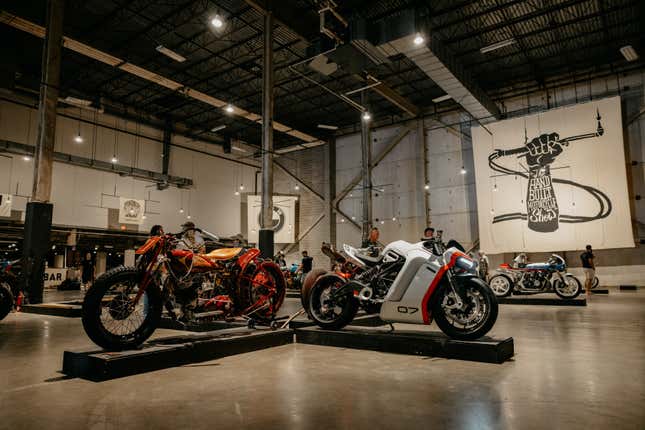
Photo: Zero Motorcycles






